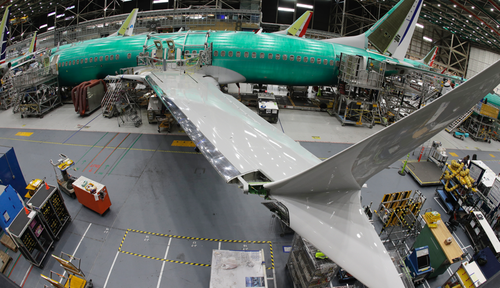
Boeing is no longer the pride of American aviation. The plane manufacturer is riddled with so many problems it's impossible to keep track. Yesterday, the FAA announced an investigation (yet another...) into a 737 Max 8 jet that encountered a dangerous mid-flight 'Dutch roll' several weeks ago. Now, a report from the New York Times reveals that some Boeing jets are built with 'counterfeit titanium.'
Some recently manufactured Boeing and Airbus jets have components made from titanium that was sold using fake documentation verifying the material's authenticity, according to a supplier for the plane makers, raising concerns about the structural integrity of those airliners.
The falsified documents are being investigated by Spirit AeroSystems, which supplies fuselages for Boeing and wings for Airbus, as well as the Federal Aviation Administration. The investigation comes after a parts supplier found small holes in the material from corrosion. -NYT
The report continued:
The planes that included components made with the material were built between 2019 and 2023, among them some Boeing 737 Max and 787 Dreamliner airliners as well as Airbus A220 jets, according to three people familiar with the matter who spoke on the condition of anonymity because they were not authorized to speak publicly. It is not clear how many of those planes are in service or which airlines own them.
Fuselage maker Spirit is investigating the source of the titanium and whether the metal meets aviation standards. The big question is if the metal used in critical parts of the airframe is structurally sound enough to last the projected life spans of the jets. If the metal is tested and found to be below aviation specs, the parts must be removed and replaced.
"This is about documents that have been falsified, forged and counterfeited," Joe Buccino, a Spirit spokesman, told NYT, adding, "Once we realized the counterfeit titanium made its way into the supply chain, we immediately contained all suspected parts to determine the scope of the issues."
According to Spirit officials, counterfeit titanium was used in passenger entry doors, cargo doors, and a component that connects the engines to the plane's airframe for 787 Dreamliners. The affected parts of the 737 Max and the Airbus A220 include a heat shield on the engine.
NYT pointed out, "Boeing and Airbus both said their tests of affected materials so far had shown no signs of problems," adding, "Boeing said it directly purchased most of the titanium used in its plane production, so most of its supply was unaffected."
Boeing released this statement:
"This industrywide issue affects some shipments of titanium received by a limited set of suppliers, and tests performed to date have indicated that the correct titanium alloy was used.
"To ensure compliance, we are removing any affected parts on airplanes prior to delivery. Our analysis shows the in-service fleet can continue to fly safely."
A complex global supply chain for producing commercial jets is likely at fault. Late last year, a London-based firm flooded the aviation market with "unapproved parts" for jet engines on older Airbus SE A320s and Boeing Co. 737s.
The counterfeit titanium issue first emerged in 2019:
The issue appears to date to 2019 when a Turkish material supplier, Turkish Aerospace Industries, purchased a batch of titanium from a supplier in China, according to the people familiar with the issue. The Turkish company then sold that titanium to several companies that make aircraft parts, and those parts made their way to Spirit, which used them in Boeing and Airbus planes.
In December 2023, an Italian company that bought the titanium from Turkish Aerospace Industries noticed that the material looked different from what the company typically received. The company, Titanium International Group, also found that the certificates that came with the titanium seemed inauthentic.
Turkish Aerospace Industries did not respond to a request for a comment.
Spirit began investigating the matter, and the company notified Boeing and Airbus in January that it could not verify the source of the titanium used to make certain parts. Titanium International Group told Spirit that when it bought the material in 2019, it had no clue that the paperwork had been forged, according to Spirit officials.
... People familiar with the situation said it appeared that an employee at the Chinese company that sold the titanium had forged the details on the certificates, writing that the material came from another Chinese company, Baoji Titanium Industry, a firm that often supplies verified titanium. Baoji Titanium later confirmed that it had not supplied the titanium. The origin of the titanium remains unclear.
This is yet another problem for the aviation industry and Boeing. Stories like these erode confidence in commercial air travel and raise the question: Has the FAA been asleep at the yoke?
Boeing is no longer the pride of American aviation. The plane manufacturer is riddled with so many problems it’s impossible to keep track. Yesterday, the FAA announced an investigation (yet another…) into a 737 Max 8 jet that encountered a dangerous mid-flight ‘Dutch roll’ several weeks ago. Now, a report from the New York Times reveals that some Boeing jets are built with ‘counterfeit titanium.’
Some recently manufactured Boeing and Airbus jets have components made from titanium that was sold using fake documentation verifying the material’s authenticity, according to a supplier for the plane makers, raising concerns about the structural integrity of those airliners.
The falsified documents are being investigated by Spirit AeroSystems, which supplies fuselages for Boeing and wings for Airbus, as well as the Federal Aviation Administration. The investigation comes after a parts supplier found small holes in the material from corrosion. -NYT
The report continued:
The planes that included components made with the material were built between 2019 and 2023, among them some Boeing 737 Max and 787 Dreamliner airliners as well as Airbus A220 jets, according to three people familiar with the matter who spoke on the condition of anonymity because they were not authorized to speak publicly. It is not clear how many of those planes are in service or which airlines own them.
Fuselage maker Spirit is investigating the source of the titanium and whether the metal meets aviation standards. The big question is if the metal used in critical parts of the airframe is structurally sound enough to last the projected life spans of the jets. If the metal is tested and found to be below aviation specs, the parts must be removed and replaced.
“This is about documents that have been falsified, forged and counterfeited,” Joe Buccino, a Spirit spokesman, told NYT, adding, “Once we realized the counterfeit titanium made its way into the supply chain, we immediately contained all suspected parts to determine the scope of the issues.”
According to Spirit officials, counterfeit titanium was used in passenger entry doors, cargo doors, and a component that connects the engines to the plane’s airframe for 787 Dreamliners. The affected parts of the 737 Max and the Airbus A220 include a heat shield on the engine.
NYT pointed out, “Boeing and Airbus both said their tests of affected materials so far had shown no signs of problems,” adding, “Boeing said it directly purchased most of the titanium used in its plane production, so most of its supply was unaffected.”
Boeing released this statement:
“This industrywide issue affects some shipments of titanium received by a limited set of suppliers, and tests performed to date have indicated that the correct titanium alloy was used.
“To ensure compliance, we are removing any affected parts on airplanes prior to delivery. Our analysis shows the in-service fleet can continue to fly safely.”
A complex global supply chain for producing commercial jets is likely at fault. Late last year, a London-based firm flooded the aviation market with “unapproved parts” for jet engines on older Airbus SE A320s and Boeing Co. 737s.
The counterfeit titanium issue first emerged in 2019:
The issue appears to date to 2019 when a Turkish material supplier, Turkish Aerospace Industries, purchased a batch of titanium from a supplier in China, according to the people familiar with the issue. The Turkish company then sold that titanium to several companies that make aircraft parts, and those parts made their way to Spirit, which used them in Boeing and Airbus planes.
In December 2023, an Italian company that bought the titanium from Turkish Aerospace Industries noticed that the material looked different from what the company typically received. The company, Titanium International Group, also found that the certificates that came with the titanium seemed inauthentic.
Turkish Aerospace Industries did not respond to a request for a comment.
Spirit began investigating the matter, and the company notified Boeing and Airbus in January that it could not verify the source of the titanium used to make certain parts. Titanium International Group told Spirit that when it bought the material in 2019, it had no clue that the paperwork had been forged, according to Spirit officials.
… People familiar with the situation said it appeared that an employee at the Chinese company that sold the titanium had forged the details on the certificates, writing that the material came from another Chinese company, Baoji Titanium Industry, a firm that often supplies verified titanium. Baoji Titanium later confirmed that it had not supplied the titanium. The origin of the titanium remains unclear.
This is yet another problem for the aviation industry and Boeing. Stories like these erode confidence in commercial air travel and raise the question: Has the FAA been asleep at the yoke?
Loading…





